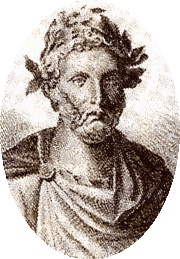Frases célebres de Plauto
Plauto Frases y Citas
“Lobo es el hombre para el hombre, y no hombre, cuando desconoce quién es el otro.”
Sin fuentes
Fuente: Asinaria.
Plauto: Frases en inglés
“You should not speak ill of an absent friend.”
Ne male loquare absenti amico.
Trinummus, Act IV, sc. 2, line 81.
Trinummus (The Three Coins)
“Not by age but by capacity is wisdom acquired.”
Non aetate, verum ingenio apiscitur sapientia.
Trinummus, Act II, sc. 2, line 88.
Trinummus (The Three Coins)
“Man is no man, but a wolf, to a stranger.”
Lupus est homo homini, non homo, quom qualis sit non novit.
Asinaria, Act II, scene 4 (line 495 of full Latin text).
Variant translation: A man is a wolf rather than a man to another man, when he hasn't yet found out what he's like.
Often quoted as "Homo homini lupus" [A man is a wolf to another man].
Asinaria (The One With the Asses)
“Keep what you’ve got; the evil that we know is best. (translator Thornton)”
Habeus ut nactus ; nota mala res optima’st.
Trinummus, Act I, scene 2, lines 25
Trinummus (The Three Coins)
“No blessing lasts forever.”
Nulli est homini perpetuum bonum.
Curculio, Act I, scene 3, line 32
Curculio (The Weevil)
“Conquer by means of true virtue.”
Casina, Prologue, line 87
Casina (The Lot Drawers)
“If you are wise, be wise; keep what goods the gods provide you.”
[S}i sapias, sapias : habeus quod di dant boni.
Rudens, Act IV, sc. 7, line 3; reported in Bartlett's Familiar Quotations, 10th ed. (1919).
Variant translation: [A] word to the wise! Keep what the Gods have given you. (translation by Cleveland King Chase)
Rudens (The Rope)
“For what is idly got is idly spent.”
Male partum, male disperit.
Poenulus, Act IV, sc. 2, line 22
Poenulus (The Little Carthaginian)
“Things we hope not for oftener come to pass than things we wish for. (translated by Thornton)”
Insperata accidunt magis saepe quam que speres.
Act I, scene 3, line 42.
Variant translation: Things which you do not hope happen more frequently than things which you do hope. (translator unknown)
Mostellaria (The Haunted House)
“Love is very fruitful both of honey and gall.”
Amor et melle et felle est faecundissimus.
Cistellaria, Act I, scene 1, line 70
Cistellaria (The Casket)
“For him I reckon lost who’s lost to shame.”
Nam ego illum periisse duco, cui quidem periit pudor.
Bacchides Act III, scene 3, line 80.
Variant translation: I regard that man as lost, who has lost his sense of shame. (translator unknown)
Bacchides (The Bacchises)
“For what is yours is mine, and mine is yours.”
Quod tuum’st, meum’st; omne meum est autem tuum.
Trinummus, Act II, sc. 2, line 47.
Trinummus (The Three Coins)
“Oh, are not the pleasures in life, in this daily round, trifling compared with the pains!”
Satin parva res est voluptatum in vita atque in aetate agunda praequam quod molestum est?
Amphitryon, Act II, scene 2.
Amphitryon
“But ne’ertheless reflect, the little mouse, how sage a brute it is! Who never trusts its safety to one hole : for when it finds one entrance is block’d up, it has secure some other outlet.”
Cogito, mus pusillus quam sit sapiens bestia, aetatem qui uni cubili nunquam committit suam : quia si unum ostium obsideatur, aliud perfugium gerit.
Truculentus, Act IV, sc. iv, line 15.
Variant translation: Consider the little mouse, how sagacious an animal it is which never entrusts its life to one hole only. (translator unknown)
Truculentus
“The face that thou shalt smite in earnest is bound thereafter to be boneless.”
Amphitryon, Act I, scene 1.
Amphitryon
“I say, Libanus, what a poor devil a chap in love is!”
Asinaria, Act III, scene 3.
Asinaria (The One With the Asses)
“Whene’er a man is quartered at a friend’s, if he but stay three days, his company they will grow weary of. (translator Thornton)”
Hospes nullus tam in amici hospitium divorti potest, quin, ubi triduum continuum fuerit, jam odiosis siet.
Miles Gloriosus, Act III, scene 1, line 146.
Variant translation: No guest is so welcome in a friend's house that he will not become a nuisance after three days. (translator unknown)
Miles Gloriosus (The Swaggering Soldier)
“One eyewitness weighs more than ten hearsays. Seeing is believing, all the world over.”
Pluris est oculatus testis unus, quam auriti decem. Qui audiunt, audita dicunt: qui vident, plane sciunt.
Truculentus, Act II, sc. 6, line 8.
Truculentus
“It is better to learn from the mistakes of others than that others should learn from you.”
Te de aliis, quam alios de te suaviu’st.
Persa, Act IV, scene 3, line 70
Variant translation: ’Tis sweeter far wisdom to gain from other’s woes, than others should learn from ours. (translation by Bonnell Thornton)
Persa (The Persian)
“Conquered, we conquer”
Victi vicimus
Casina, Act II, scene viii, line 74
Casina (The Lot Drawers)
“Ne male loquare absenti amico.”
You should not speak ill of an absent friend.
Trinummus, Act IV, sc. 2, line 81.
Trinummus (The Three Coins)
“In re mala animo si bono utare, adjuvat.”
Our best support and succor in distress is fortitude of mind. (translator Thornton)
Captivi, Act II, scene 1, line 8
Variant translation: The best assistance in distress is fortitude of soul. (translator unknown)
Captivi (The Prisoners)
“I had a regular battle with the dunghill-cock.”
Aulularia, Act III, sc. 4, 13; reported in Bartlett's Familiar Quotations, 10th ed. (1919).
Aulularia (The Pot of Gold)
